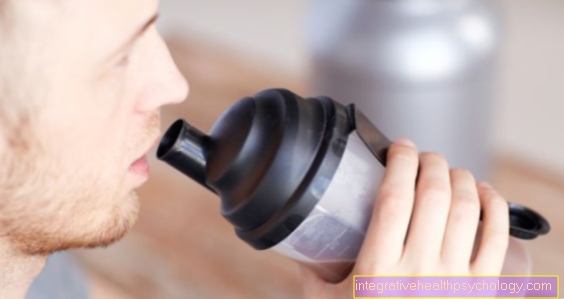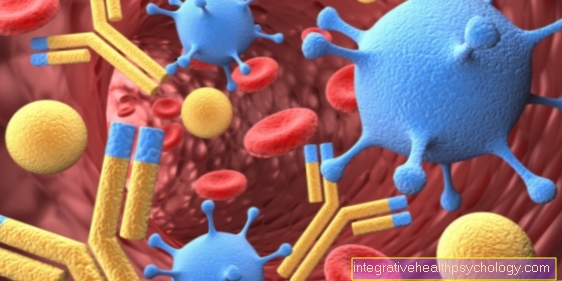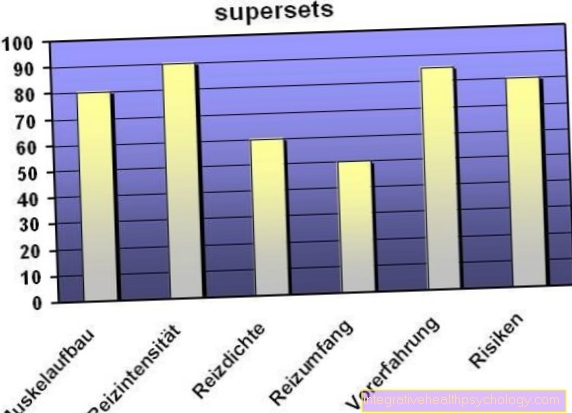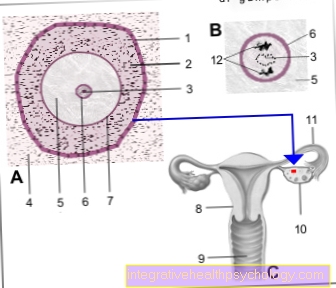Dependence on nasal spray
definition
A wide variety of medications are used when the upper respiratory tract is infected, such as a runny nose. One of them is nasal spray. When buying the mostly over-the-counter drugs, pharmacists always emphasize specifically that the nasal spray is not intended for long-term use.This information is very relevant, as excessive nasal spray consumption can lead to changes in the mucous membrane and to addiction, as is already the case with over 100,000 people in Germany.
The result is an ever increasing consumption of nasal spray and normal breathing without the use of this drug becomes almost impossible. Long-term use leads to certain changes in the nose and health consequences due to the action of the substance xylometazoline, which is mostly contained. There are a number of ways in which you can wean yourself off and should be sought by all long-term consumers.

causes
The main ingredient in common nasal sprays is xylometazoline. It belongs to the group of so-called sympathomimetics, a class of active substances that activate the sympathetic nervous system. The decisive effect of the nasal spray is the narrowing of the blood vessels in the nasal mucous membrane, which leads to the swelling of the mucous membrane and the nose becoming free when you have a cold.
Regular use of nasal spray, however, leads to a so-called boomerang or rebound phenomenon: The mucous membranes have got used to the decongestant effect of the spray and therefore swell again after they have subsided. The renewed swelling leads to repeated use of the drug, which ultimately leads to a vicious circle. The nasal spray treats the swollen nasal mucous membranes and causes the swelling at the same time.
Read more about the topic here: Swollen nasal lining
How fast does it go?
In the instruction leaflets of common nasal sprays with xylometazoline, the use of a maximum of 7 days recommended. After a week a break of several days inserted if there is still a need for the drug. Exceptions must be discussed in any case with the attending physician or the family doctor, since after more than one week of use first changes in the nasal mucosa can be observed. Getting used to the active ingredient takes place relatively quickly. Many patients underestimate the addiction potential of nasal spray and continue to use it beyond the recommended time.
Symptoms
The dependence on nasal spray is mainly shown by one frequent use of the drug, whereby the effect leaves something to be desired. The nasal mucous membrane gets used to the active ingredient and at some point no longer reacts effectively to the application. This leads to the actual main symptom of a nasal spray addiction - chronic runny nose, that too Medicinal rhinitis (Rhinitis medicamentosa) is called.
When you have a runny nose, the nose is permanently blocked and can no longer be cleared by using what was once supposedly a healing spray. The inadequate effect not only leads to panic among users, but also leads them to resort to sprays with higher doses. It must be noted that there is also a Xylometazoline poisoning can come. The symptoms are very different because Phases with symptoms of physical activation (Excitement, hallucinations, convulsions) with inhibited phases (decreased body temperature, drowsiness, up to a coma) can alternate. This is caused by the stimulation and inhibition of the central nervous system, which in turn is related to the effect of xylometazoline on the sympathetic nervous system.
Therapy / what to do

Once a dependency has arisen, it often develops difficult, to get away from it. For your own health, however, it is very important that you can breathe normally without using nasal sprays. A weaning of xylometazoline-containing drugs.
You can get one from your treating doctor, for example nasal spray containing cortisone get a prescription. This works slower, but also has one decongestant and anti-inflammatory effects. Due to the side effects of cortisone treatment, this nasal spray may only be used for a short time. It would be better to use Sea water sprays (containing salt water), which keep the nasal mucous membrane moist and can prevent swelling caused by irritation. Nasal sprays containing cortisone are prescription only, whereas seawater sprays are already available in many supermarkets.
Another option is to reduce the number of sprays by getting only one nostril at a time treated. Breathing is made possible, but the total dose of used nasal spray is reduced, thus making the first step towards weaning. In the course of the Nostrils changedso that there is no unilateral change in the mucous membrane. The aim is to keep reducing the number of sprays per day until it is no longer necessary to switch to the other nostril and the weaning is done.
A third way is that Dose reduction. The nasal spray is initially purchased in a lower strength, for example as a children's medicine. After some use of the weakened drug, the spray is diluted again with saline solution. This can be purchased at the pharmacy or prepared independently at home (9 grams of salt in 1 liter of water).
The goal is to switch entirely to sea salt spray or - which is even more desirable - do without a nasal spray entirely.
As support for weaning can be in the pharmacy Pseudoephedrine tablets (e.g. Rhinopront®) can be purchased. These have in weakened form the same effect on the vascular system of the nasal mucosa as topically applied xylometazoline, without stressing the nasal mucosa as much. The consumption of tablets must also be reduced daily by the consumer in order to achieve the desired goal.
Nasal spray in pregnancy
To date, there has not been enough scientific research into whether it is safe to use a nasal spray with xylometazoline during pregnancy or while breastfeeding. There is a possibility that an overdose will negatively affect the patient Blood supply to the baby has or is breastfeeding Inhibits the production of breast milk.
Only at absolute necessity and at the decision of the attending physician, the use of the drug should follow after a precise risk-benefit assessment. The mother must make sure that only the recommended doses be taken and the maximum period not exceeded becomes.
Also read our pages Medication during pregnancy and Medication during breastfeeding.
consequences
Due to the excessive use of nasal spray as part of an addiction it comes to Changes in the lining of the nose. It becomes dry and cracked - crusts form, which then often become too Epistaxis from the nasal spray to lead. An effective blood circulation is no longer given due to the constant narrowing of the mucous membrane vessels and therefore no optimal supply of the mucous membrane. This weakens the defense function and increases the susceptibility to infection.
Next chronic respiratory infections the upper respiratory tract can also become one severe breakdown of the mucous membrane come. This so-called Nasal mucosal atrophy includes the regression of the inner wall of the nose with its vessels and mucous glands. As a result, on the one hand, the breathing air is no longer sufficiently humidified before it reaches the deeper airways and the lungs. That can make you more susceptible to Inflammation of the lower respiratory tract (Bronchitis, pneumonia) to lead. On the other hand, a larger cavity is created in the nose, which in rare cases can be a breeding ground for bacteria. One example of this is the bacterial strain Klebsiella ozaenae, that gives off a sweet, putrid smell. This is often not perceived by the patient due to the olfactory nerve damage, but by partners, friends or relatives. This disease is also known as Smelly nose.
Side effects
The side effects of common nasal sprays are very similar because they mostly contain xylometazoline. Some people are very sensitive to the active ingredient, which is in one burning sensation in the nose and Dryness of the mucous membrane expresses. Long-term use can affect the nasal mucosa too Crust formation (Rhinitis sicca) and to Medicinal rhinitis to lead.
Since the active ingredient stimulates the sympathetic nervous system, which in turn activates the body, it can occasionally cause side effects on the Cardiovascular system come. The patients report of after using the nasal spray Racing heart and clearly palpable heartbeats. Also a increased blood pressure can result from the application. There are side effects affecting the nervous system a headache, as well as the opposite symptoms fatigue and insomnia. These rarely occur.





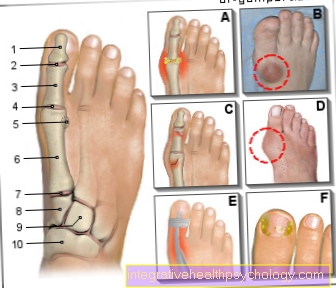





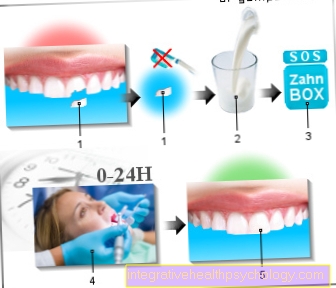

.jpg)






